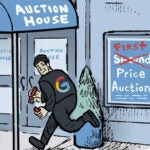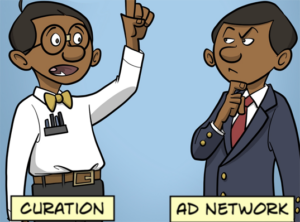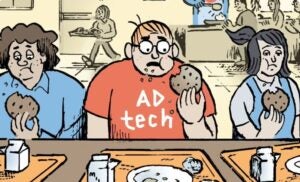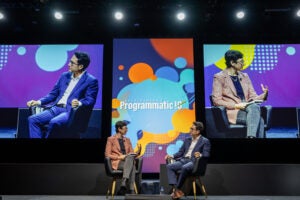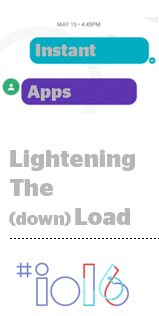 The web gets surfed and apps get downloaded. That’s the way it generally works. But Android Instant Apps – the ability to stream apps without having to install them – changes the math on that equation.
The web gets surfed and apps get downloaded. That’s the way it generally works. But Android Instant Apps – the ability to stream apps without having to install them – changes the math on that equation.
Google trotted out its new app regime at its I/O developers conference on Wednesday amongst other flashier fare – everything from chatbots and AI to home assistants and VR – but Instant Apps is the most revolutionary of the bunch.
Users who click on a URL are instantly deep-linked into the content they’re looking for, sans download.
App downloads have always been a hurdle for users and developers alike. App developers are compelled to pay ad networks to generate installs and those users are often incentivized, which leads to low-quality downloads and dire retention rates.
Fewer than 25% of people who download an app come back after the first time they use it, according to data released by Appboy on Thursday, while Localytics found that around 75% of all app users drop off within 90 days.
That doesn’t leave a lot of monthly active users to monetize.
“But engagement is a far better proxy for success than a download,” said Charles Manning, CEO of Kochava. “And clickable links to streaming apps typifies the notion that the install is not the focal point – rather the engagement itself.”
Try Before You Buy Download
The potential use cases are manifold – testing out games, sampling services, streaming apps you only plan to use infrequently, sharing deep links to specific app content even if the recipient doesn’t have the app in question installed. (The way it works now, if the end user doesn’t have the app installed, that person is taken to the respective app store to download the app before being deep-linking to the appropriate content.)
“Downloading an app is the single biggest barrier to entry for new app developers,” said TUNE CEO Peter Hamilton. “Consumers download a limited number of apps, and the commitment to download an app may be too large before a customer is fully engaged with a business.”
Instant Apps are also a shot in the arm for m-commerce. They’ll integrate with Android Pay, which means users can make purchases without having to enter their credit card info at checkout.
It’s a “natural evolution of mobile” that combines the macro trends around the growing desire for instant access to content and the continued advancements in cloud computing, said Jim Cridlin, managing director of strategy, innovation and partnership at Mindshare North America.
Android Instant Apps “leverage both of those trends to create more natural, seamless consumer experience,” Cridlin said.
But Google’s move isn’t just about improving UX. Google has a lot invested in ensuring that the mobile web isn’t sidelined to apps. Mobile apps account for 54% of all time spent on digital media, according to comScore.
Unlike for Apple – which, it should be noted, originated the concept of the app download – the web is a core part of Google’s DNA. It has a vested interest in creating a more fluid, link-driven app experience for users.
Google’s “entire business is dependent upon the evolution of the web,” said Neil Sweeney, CEO of JUICE.
“People don’t want 150 different apps on their phone if they only use a dozen or so, and anytime you can reduce friction for the consumer, that’s never a bad thing – but that’s not why Google is doing this,” Sweeney said. “What they’re afraid of is that the whole world is becoming application-driven and that doesn’t feed into their existing core methodology.”
Of course that doesn’t mean that either apps or the mobile web is destined to “win.” There’s a role for both to play as a blended experience.
Cridlin’s sense is that Android Instant Apps will be “more app-like than web-like” in nature. It’s the distribution and search bits that’ll feel more like the web.
 “Consumers have embraced apps,” Cridlin said. “The indications are that they prefer the focused, intuitive experience most apps provide.”
“Consumers have embraced apps,” Cridlin said. “The indications are that they prefer the focused, intuitive experience most apps provide.”
Metrics Reimagined
But what about measurement?
“We’re all going to have to rethink metrics – not just developers, but also the business side and even advertisers,” said Todd Miller, a former Yahoo exec who signed on as Cheetah Mobile’s VP of global sales on Wednesday. “Raw download numbers have been overemphasized in our industry for awhile.”
Most sophisticated app developers out there have already transitioned away from the download and toward engagement and lifetime value as core markers of success. It’s a true science. They know the value of every move a user makes down to the penny.
Now they’ll have to think about how to value a streaming app user – a murky designation that exists somewhere between click and download.
It might make sense for the price to be higher, for example, if a user clicks, streams and goes on to download the full app, rather than just clicking and streaming, Manning said.
But it could also depend on the KPI and the type of app it is. Not all apps are made to be used everyday – a parking meter app, for example, or an app for booking concert tickets – so if a user streams them more than once during a certain period of time, perhaps that’s akin to retention.
But at Mindshare, clients are even moving beyond engagement-type metrics in favor of clear ROI. “Like all other initiatives, we’ll be interested in seeing what this can do to drive sales,” Cridlin said.
Your Move, Apple
Despite the efforts of deep-linking companies like Branch, Button, Quixey and URX (whose team was just snapped up by Pinterest), apps are still like “islands on your phone,” Sweeney said. “Essentially a bunch of walled gardens that don’t speak to one another.”
Regardless, iOS has dominated the app download gambit – the cumulative number of apps downloaded from the App Store since it launched in 2008 tops 100 billion – and there’s little reason for Apple to move away from that model, Sweeney said.
“Apple has always been of the approach that they want to control everything and Google is going the opposite way,” he said. “Apple’s business is far less dependent on the browser, so for them, there’s no benefit in getting away from apps – zero – and it’s a shift they’ll only make if they absolutely have to. But they’re not going to carry to flag.”
But Cridlin could see Apple following suit in deference to changing consumer preferences and behavior.
Most people have far more apps installed than they actually use on a regular basis, and that’s not profitable for developers who rely on engaged users for revenue. There’s no point in pushing a download for an app that someone is only going to access or need occasionally.
Even though Sweeney doesn’t see Apple embracing an Instant Apps-like model anytime soon, a shift toward a more open system is inevitable.
“I remember going to an application developers conference five years ago where I stood up and said, ‘Apps are dead’ – and everyone wanted to Kanye the stage and kill me,” Sweeney said. “But the point I was making and that I still think is true is that the walled garden doesn’t work here.”
Google plans to roll out Instant Apps by the end of the year. Once it’s released, Google will make it compatible with all Android mobile operating systems going back to Jelly Bean, which debuted in July 2012, thereby opening it up more than 1 billion Android users.



